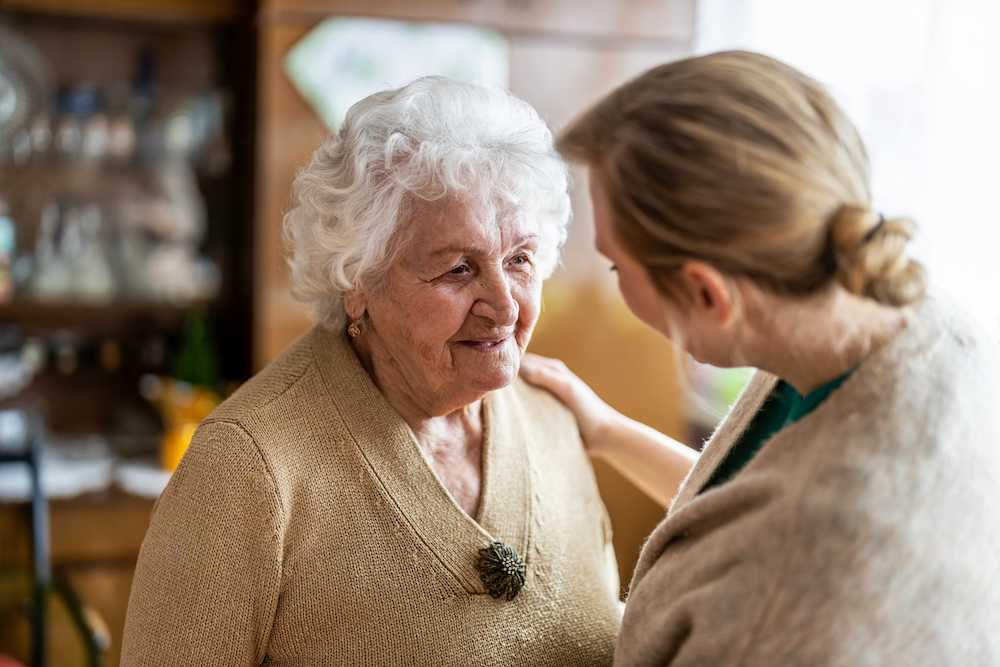As our loved ones get older, it can be difficult to see them struggling with simple things like remembering names, dates, food likes and dislikes, and more. We want our loved ones to remain the same, wanting to keep them with us without having them change at all, but that’s often not the reality.
But the real question still stands: is all memory loss in seniors actually Alzheimer’s disease? The short answer is no. There can be a plethora of reasons as to why your senior might be starting to have trouble with their memory, and Alzheimer’s is only one possibility.
However, no matter if you are able to see that transition coming or not, it’s still a difficult change to deal with. Plus, deciding on if memory care services might be for you can put a strain on anyone. So, how do you know if memory care services might be right for your loved one, and how do you know what might be causing this memory loss? Let us help:
What Exactly is Alzheimer’s?
In short, Alzheimer’s Disease is a brain disorder that slowly but surely destroys memory and thinking skills. As the disease progresses over the years, Alzheimer’s will eventually destroy a senior’s ability to do simple tasks and take care of themselves. Typically, Alzheimer’s disease sets in during a senior’s late fifties to early sixties, making this a disease that primarily affects our elderly loved ones. Alzheimer’s is also often the most common cause of dementia.
All Alzheimer’s Has Forgetfulness, But Not All Forgetfulness is Alzheimer’s
Alzheimer’s disease will always cause forgetfulness, but not all memory loss and forgetfulness in seniors is caused by Alzheimer’s. These two factors are not mutually exclusive. Before you decide to see if your senior needs memory care services, it’s worth a look to see if your senior’s memory loss may be a result of some kind of outside force or is something that can be prevented or reversed.
First, think if your senior may have bumped their head at some point in the recent past. Did they fall, or did they maybe bump their head getting out of bed or on an open cabinet door? These things might seem small, but as our senior loved ones age, even seemingly small injuries can have major effects on our senior’s health and wellbeing.
Medications can also negatively affect memory in your senior. Before you switch gears, check to see if your senior has gotten any new medicines or maybe has tried a new combination of medicines. It may seem strange, but trying new medicines or strange combinations of medicine can actually affect your memory just as badly as bumping your head! Combine that medicine with something like alcohol, and you’ve got an entirely new can of worms.
There are several other reasons why your senior may be suddenly struggling with memory loss and forgetfulness. Vitamin B-12 deficiency, hypothyroidism, brain diseases, and brain tumors can also affect your senior loved one’s memory and recall.

Reversible Forms of Memory Loss
While Alzheimer’s is not reversible, many of the other forms of memory loss are reversible or preventable if action is taken quickly. If you see that your senior loved one is struggling with their memory, then it might be time to speak to your senior’s primary care physician to see if anything has gone on lately.
Things like Vitamin B-12 deficiency can be easily remedied by taking supplements, while other conditions like the brain tumor can be remedied with surgery. Of course, nothing is guaranteed to be one hundred percent effective at all times, but knowing what’s going on is half the battle.
How to Help a Family Member With Memory Loss
Helping a family member with memory loss can be hard on everyone in the family. For those who may not understand – and even those who do – seeing a family member or loved one struggling with basic self-care and recall is a difficult sight to witness. However, it’s important to remember that your loved one suffering from Alzheimer’s, dementia, or another condition that causes this memory loss isn’t at fault.
1.) Practice Patience
The most important thing you can do when speaking to or assisting with a family member with memory impairments is to be patient. Most of the time your senior loved one is not going to understand what is happening, who everyone is, and more. Be patient with them. Getting angry and upset is only going to make things more difficult for everyone.
2.) Explain to All Family Members What to Expect
Dealing with such a huge change in a loved one’s demeanor is an adjustment for anyone. That is why it’s extremely important to try to educate everyone on what they should expect. Explain the possible symptoms that may arise from Alzheimer’s and how to best combat those. Recognize that it isn’t going to be easy to talk about it, but it’s a subject that everyone needs to be informed about.
3.) Don’t Be Afraid to Ask For Help
Taking care of a loved one with memory impairments is one of the most difficult jobs out there. Being a caretaker is physically, mentally, and emotionally exhausting, and it’s okay to recognize that you can’t handle everything on your own. Don’t be afraid to hire a home health aide or, if your loved one’s case is more severe, to look into memory care services to keep them safe, happy, and well.
Bayshire Carlsbad
Here at Bayshire Carlsbad, we make sure that our memory care services provide everything you need to ensure your loved one is in safe hands with us here. Our 24-hour securely monitored area is spacious, comfortable, and manned by dedicated and well-trained staff to ensure your loved one is safe and healthy at all times. Plus, our Sagely app integration allows you to check to see what we have in store for your senior and keep up to date at all times.
If you’re interested in Barshire Carlsbad’s memory care services for your loved one, please contact us and schedule a tour today!



